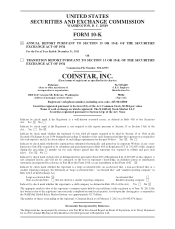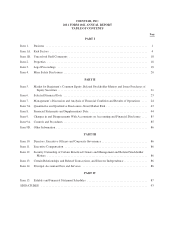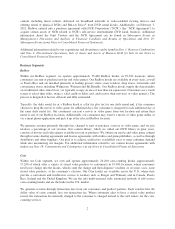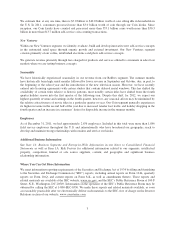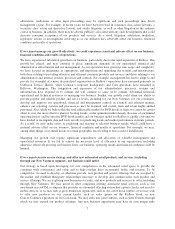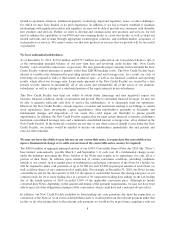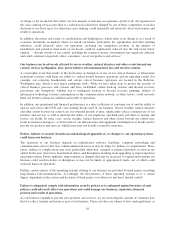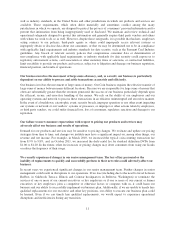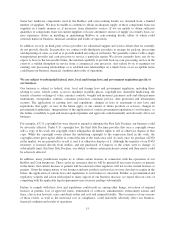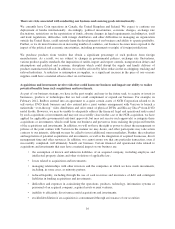Redbox 2011 Annual Report Download - page 17
Download and view the complete annual report
Please find page 17 of the 2011 Redbox annual report below. You can navigate through the pages in the report by either clicking on the pages listed below, or by using the keyword search tool below to find specific information within the annual report.consolidated leverage ratio test specified in that facility. Any agreements or indebtedness we enter into or incur
in the future may further restrict our ability to pay interest on, carry out the fundamental change repurchase
obligations relating to, or make payments (including cash) upon conversion of, the Notes.
Further, if we fail to pay interest on, carry out the fundamental change repurchase obligations relating to, or make
payments (including cash) upon conversion of, the Notes, we will be in default under the indenture governing the
Notes. A default under the indenture or the fundamental change itself could also lead to a default under
agreements governing our existing and future indebtedness, including our New Credit Facility. If the repayment
of indebtedness were to be accelerated, including after any applicable notice or grace periods, we may not,
among other things, have sufficient funds to repay indebtedness or pay interest on, carry out our repurchase
obligations relating to, or make cash payments upon conversion of, the Notes.
Conversion of our convertible notes into common stock could result in additional dilution to our
stockholders.
Upon satisfaction of certain conversion conditions (including conditions outside of our control, such as market
price or trading price) and proper conversion of the Notes by a holder, we may be required to deliver shares of
our common stock to a converting holder. For each $1,000 principal amount of Notes converted, a holder
receives an amount in cash equal to $1,000, and, if the conversion value (as determined by the terms of the
indenture) exceeds $1,000, the holder will also receive a number of shares of our common stock based on the
excess conversion value. The number of shares of common stock potentially to be issued upon conversion of the
Notes increases as the market price of our common stock increases during the conversion value measurement
period. If shares of our common stock are issued due to conversion of some or all of the Notes, the ownership
interests of existing stockholders would be diluted. Further, any sales in the public market of any shares of
common stock issued upon conversion or hedging or arbitrage trading activity that develops due to the potential
conversion of the Notes could adversely affect prevailing market prices of our common stock.
Competitive pressures could seriously harm our business, financial condition and results of operations.
Our Redbox business faces competition from many other providers, including those using other distribution
channels, having more experience, greater or more appealing inventory, better financing, and better relationships
with those in the movie and video game industries, than we have, including:
• mail-delivery and online retailers, like Netflix or Amazon;
• traditional video retailers, like Blockbuster and other local and regional video rental providers, and
other DVD kiosk businesses;
• other retailers like Walmart and other chain stores selling DVDs and video games;
• cable, satellite, and telecommunications providers, like Comcast or DISH Network;
• traditional movie programmers, like HBO or Showtime;
• other forms of movie content providers like Internet sites including iTunes, YouTube, Hulu or Google;
• other forms of video game rental providers, like GameFly;
• noncommercial sources like libraries; and
• general competition from other forms of entertainment such as movie theaters, television and sporting
events.
Our Coin business faces competition from supermarkets, banks and other companies that purchase and operate
coin-counting equipment from companies such as ScanCoin, Cummins-Allison Corporation and others. Our
retailers may choose to replace our coin-counting kiosks with competitor machines and operate such kiosks
themselves or through a third party, or not carry coin-counting kiosks at all deciding that floor space could be
used for other purposes. In addition, retailers, some of which have significantly more resources than we do, may
decide to enter the coin-counting market. Some banks and other competitors already provide coin-counting free
9


